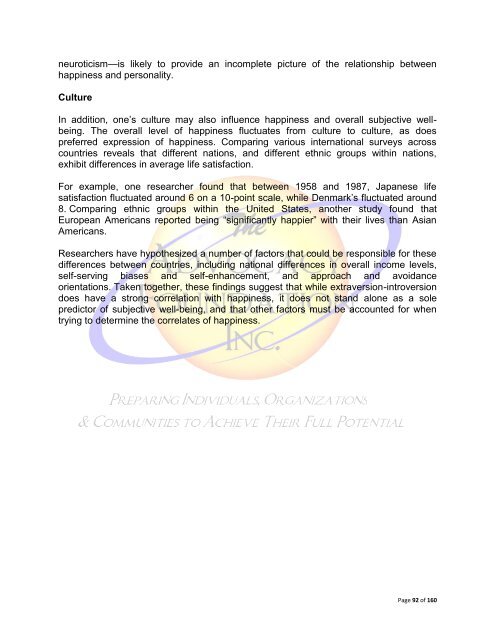The Gift of Introversion
The Gift of Introversion
The Gift of Introversion
Create successful ePaper yourself
Turn your PDF publications into a flip-book with our unique Google optimized e-Paper software.
neuroticism—is likely to provide an incomplete picture <strong>of</strong> the relationship between<br />
happiness and personality.<br />
Culture<br />
In addition, one’s culture may also influence happiness and overall subjective wellbeing.<br />
<strong>The</strong> overall level <strong>of</strong> happiness fluctuates from culture to culture, as does<br />
preferred expression <strong>of</strong> happiness. Comparing various international surveys across<br />
countries reveals that different nations, and different ethnic groups within nations,<br />
exhibit differences in average life satisfaction.<br />
For example, one researcher found that between 1958 and 1987, Japanese life<br />
satisfaction fluctuated around 6 on a 10-point scale, while Denmark’s fluctuated around<br />
8. Comparing ethnic groups within the United States, another study found that<br />
European Americans reported being “significantly happier” with their lives than Asian<br />
Americans.<br />
Researchers have hypothesized a number <strong>of</strong> factors that could be responsible for these<br />
differences between countries, including national differences in overall income levels,<br />
self-serving biases and self-enhancement, and approach and avoidance<br />
orientations. Taken together, these findings suggest that while extraversion-introversion<br />
does have a strong correlation with happiness, it does not stand alone as a sole<br />
predictor <strong>of</strong> subjective well-being, and that other factors must be accounted for when<br />
trying to determine the correlates <strong>of</strong> happiness.<br />
Page 92 <strong>of</strong> 160

















